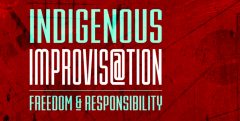 MUN Colloquium 2018
MUN Colloquium 2018
Indigenous Improvisation: freedom and responsibility
July 4-5, 2018
School of Music and the Music Media and Place research centre at Memorial University of Newfoundland
Indigenous Improvisation: freedom and responsibility took place at the School of Music and the Music Media and Place research centre at Memorial University of Newfoundland on July 4-5, 2018. Invited artists and scholars, including Frode Fjellheim (Sámi), Trevor Reed (Hopi), Dawn Avery (Mohawk) and others who incorporate improvisation in their creative/performance work, gathered from First Nations communities in North America, Indigenous Taiwanese communities, and Sámi communities in Scandinavia. Several also performed during the Sound Symposium XIX (festival of new music and sound), held from July 5-15, 2018 in St. John’s, Newfoundland.
The colloquium was free and open to the public.
Indigenous performers, composers and song-makers have a long history of engagement with certain improvisatory traditions, including jazz, contemporary classical music, and popular music. At the same time, contemporary Indigenous music production is often rooted in specific traditions of one or more of the 500 First Nations in North America or one of the nine Sámi groups of Scandinavia, among thousands of other Indigenous peoples, of course. These “roots” might involve not only the use of traditional sonic elements but might cast such matters as lineage, ownership, stylistic borrowing, and social responsibility in specific ways that differ from Euroamerican-centric assumptions. There are Indigenous traditional genres that are largely improvised or involve improvisation (e.g., Sámi joik, Inuit throat singing).
There are many other contexts, however, where improvisation would be disrespectful. Some contexts require strictly accurate performance of appropriate repertoire that is not shared outside of appropriate contexts. The “freedom” of humans is complicated by the recognition that songs in some Indigenous nations are received via dreams, visions, or non-human relations, and the rights to songs may be given through inheritance, gift-giving or some other interpersonal relationship. There are protocols for such things as the use of certain instruments, or the proper ways of sharing repertoire, even in fluid traditions such as powwow. These protocols present challenges for cross-cultural collaboration. In Indigenous contexts, song knowledge usually carries responsibilities. As Russell Wallace indicates, there is a responsibility to the song itself: “I, as a traditional singer, need to know that the music I share will not be used to sell beer or put into any other context that might bring harm to the songs” (Russell Wallace, Salish, 2017). The implications of these relational obligations for intercultural projects or even pedagogical workshops for culturally diverse participants are complex. There is also a long history of appropriation, most famously the mass marketing and global use of such instruments as didgeridoo and djembe, or the compilation of Aboriginal (and other ethnic) “samples” that are marketed to the film industry in particular. Every First Nation has protocols that relate to song and performance rights. Both within and beyond Indigenous communities, however, there are many debates about these issues.
The event focused on the complex relationship of individual freedom and social responsibility in the context of Indigenous artistic practice and collaboration. Speakers and workshop leaders during the colloquium addressed such questions as: To what extent and in what ways do they draw upon traditional elements when they improvise? How do Indigenous protocols play a role in their practice? How do inter-Indigenous exchanges work best? What are the challenges and synergies of intercultural (Indigenous/non-Indigenous) performance?
Presented by the IICSI with support from the School of Music, the MMaP, and Memorial University of Newfoundland.
Contact: Ellen Waterman at [email protected] or Beverley Diamond [email protected].
To learn more about the colloquium and keynote speakers visit the Indigenous Improvisation: freedom and responsibility website.







